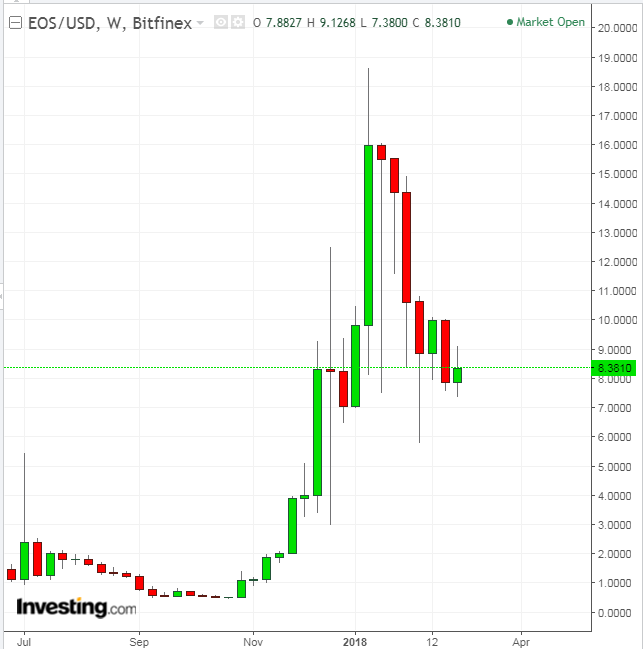Recent buzz about EOS, the ninth most popular cryptocurrency with a current market cap of nearly $6B is that it is capable of overtaking Ethereum, which has been sitting pretty in second position for quite some time now. Indeed, some even believe that eventually EOS could overtake Bitcoin. Could there be any truth to these lofty claims?
For those unfamiliar with EOS, it was created by Block.one, a Cayman Islands-based company and released in mid-2017. The project is headed by Dan Larimer who is also the founder of Steem, an alt-coin that powers the social media platform Steemit, and Bitshares, a decentralized platform for cryptocurrency trading.

EOS, though still in its ICO (initial coin offering) stage, which will run for over twelve months, is trading at $8.38 at time of writing. EOS aims to become the new blockchain operating system, faster and more scalable than Ethereum, allowing users to build decentralized applications more efficiently.
Why is EOS being dubbed a direct competitor to Ethereum? Dror Medalion, CEO and founder of bitJob a decentralized P2P marketplace for students looking for online short-term jobs, says:
“This [EOS] software enables vertical and horizontal scaling of decentralized applications. It affords authentication, accounts, database, asynchronous communication and can schedule applications over numerous CPU cores and clusters.”
Medalion explains that while there are already a variety of blockchain-based networks like Ethereum (which expedite decentralized applications), EOS concentrates on the critical pain-points of blockchain and attempts to solve the problem of scalability, speed, and flexibility that often become a bottleneck for many of the other blockchain-based systems currently in use.
“One main example is the difference between EOS and Ethereum in the blockchain consensus mechanism.Whereas Ethereum uses Proof-of-Work (and will soon switch to hybrid Proof-of-Work/Proof-of-Stake), EOS will use Graphene technology that utilizes the Delegated Proof-of-Stake (DPOS) consensus mechanism. [Proof-of-Work and Proof-of-Stake often] causes a huge difficulty to fix broken applications, but EOS already has a mechanism that can freeze and fix the application."
Dor Konforty, CEO and Co-Founder of Synereo, a developing blockchain-enabled firm, notes that while the underlying technology has yet to prove itself, EOS is different from other Ethereum competitors in that it is heavily funded as well as backed by big names in both the crypto and real-world tech industry.
Partners with Bancor
In June 2017 Bancor—developers of the Bancor Protocol which allows users to easily convert between tokens, thus enabling greater blockchain liquidity—announced that it was partnering with EOS. Implementation on EOS.IO is scheduled for release in June 2018.
Currently, Ethereum is the only cryptocurrency whose blockchain enables the Bancor Protocol. This provides EOS with a significant leg up, while dissolving one of Ethereum's key moats. Says Konforty:
“Ethereum has worked hard to establish and expand its network all over the world; EOS can simply pay projects to use its technology. Some companies won't have a choice, themselves backed by the aforementioned big names.I just hope the technology is sound. Otherwise, this play is going to derail the efforts to create a real, functional and robust decentralized infrastructure for the new web."
As well, there are many notable differences in the design of EOS. Noam Copel, CEO and Founder of DAV Foundation explains that the EOS design philosophy, its consensus algorithm and its economic model, are completely different than those of Ethereum. But he also underscores Ethereum's earlier-to-market advantage, which remains in effect:
“One of the potential benefits of the way EOS is building its platform is improved scalability — faster, cheaper processing of large transaction volumes. However, Ethereum has something very important that EOS lacks: the world's largest network of tokens, developers, and products based on its platform. Also, let's not forget that Ethereum developers are working these days on significantly upgrading their platform's scalability. Whether EOS catches up to Ethereum's growing network effect before Ethereum demonstrates the ability to boost scalability remains to be seen.”
FOMO and oversaturated ICO market
Medalion warns that new projects are coming to market so rapidly now that most investors hardly have the time to complete adequate due diligence in order to pick up everything they need to know about each new project. And the pace of new ICOs continues to speed up. For the majority of investors, buzz and escalating prices drive a sense of FOMO (Fear of Missing Out). Medalion notes that even in this way EOS is different, making it easier and potentially safer for interested buyers to invest in EOS:
“EOS has chosen to adopt a different strategy by running their ICO for one year. Therefore, it creates full trust by potential investors; They have the time to do a depth market research before they choose to join. In our opinion, choosing this path leads EOS to increase their income and to fulfill their vision.”
Crypto aficionados are well aware of the perils of ICOs though new investors may not be as well informed.
Concerns about the riskiness of investing in new coin offerings without fully understanding the underlying technology are well founded. A recent survey by bitcoin.com showed that about half of the 902 crowdsales ICOs in 2017 failed. EOS's technology, alongside its alternative sales model may just prove to be a new paradigm in the alt-coin space.
